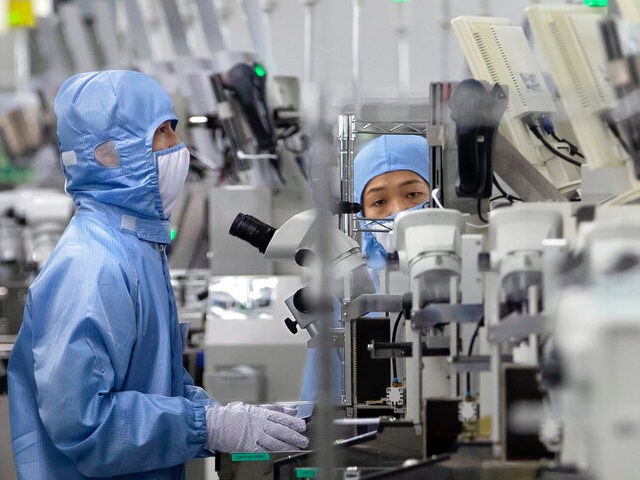The Japanese financial newspaper Nikkei Asia reported on Thursday that the government of China is considering banning the export of technology used to create rare-earth fueled high-performance magnets, often used in electric vehicles and other advanced technology.
The report did not cite any sources. Kyodo News, another Japanese outlet, followed with its own report signaling the same potential prohibition from Beijing, claiming that the ban was present in a “proposed revision to its [China’s] export control measures.” Both outlets reported that the potential export ban stemmed from the Communist Party process of updating the nation’s export control list, untouched since 2020.
China eyes banning export of rare earth magnet technology https://t.co/80uwWyv2Oz
— ABS-CBN News (@ABSCBNNews) April 6, 2023
The news follows growing tensions between China and some of the most influential countries on the rare-earth technology supply chain: America, Japan, and the Netherlands. Japan added 23 items to its export control list last week, most of them materials or technology used to make semiconductors, which often require rare-earth minerals and are pivotal for electric vehicles and other “green” energy. The Japanese move followed a similar one out of the Netherlands that Washington urged the countries to take.
BREAKING: Japan to restrict chipmaking equipment exports, with eye on China.#Japan #Chinahttps://t.co/R00Z2RD3Pj
— Nikkei Asia (@NikkeiAsia) March 31, 2023
“The U.S. in October imposed sweeping export restrictions on shipments of American chipmaking tools to China, but for the restrictions to be effective it needs other key suppliers in the Netherlands and Japan, who produce key chipmaking technology, to agree,” Reuters reported in March.
China filed a formal complaint over Japan’s moves before the World Trade Organization (WTO) this week, adding to an already existing complaint against the United States.
According to Nikkei, the items on the table for a potential export ban in China include “technology to process and refine rare-earth elements.”
“There are also proposed provisions that would prohibit or limit exports of alloy tech for making high-performance magnets derived from rare earths,” the report continued. “In all, there are 43 amendments or additions in the draft list first announced in December by the commerce and technology ministries.”
The magnets in question are required for electric vehicles. Some of the technology potentially affected by the ban also powers smartphones and “green” energy technology such as wind turbines. Rare-earth minerals also go into the production of computers, fiber optics, and electric generators.
The magnets affected by such a ban are a priority for the Japanese economy, a leader in manufacturing them. Nikkei noted that Japan makes the magnets “while the U.S. produces products that use the magnets.” Japan’s magnet production increased significantly after China banned the export of rare-earth minerals to Japan in 2010, punishing Japan for rejecting China’s claims to Japanese territory in the East China Sea — and leaving Japan to find another corner of the rare-earth supply chain to prosper in.
Japan and China have long maintained an acrimonious relationship, first in response to Japan’s atrocities in China during World War II and, more recently, the result of Japan’s opposition to Chinese communist imperialism in the region. Beijing nonetheless welcomed Japanese Foreign Minister Hayashi Yoshimata last weekend to meet with his counterpart, Chinese Foreign Minister Qin Gang, and several other high-ranking officials.
In his meeting with Hayashi, Qin emphasized China’s stern condemnation of Japan’s export controls on semiconductor technology.
“Japan has suffered that pain, and should not help a villain do evil. The containment will only further stimulate China’s determination to become self-reliant,” Qin said, referring to America. The Chinese diplomat accused Washington of similarly “bullying” China with policies to aid American industry in competing with Japanese semiconductor manufacturers.
Following their meeting, the Chinese Foreign Ministry again condemned Japan’s moves, failing to mention Hayashi’s visit during its regular press briefing the Monday after.
“China has made serious démarches to the Japanese side at various levels to express our strong discontent and grave concerns,” spokeswoman Mao Ning said. “The potential export control targeting China will not only affect the industrial and supply chains of semiconductors in the region and the wider world, and will also hurt Japanese companies.”
The Chinese state newspaper Global Times revealed on Wednesday that China had taken a further step in opposing the Japanese moves by filing a lawsuit against Japan at the WTO. The semiconductor export controls, the Chinese Commerce Ministry insisted, were a violation of the WTO’s rules.
“We hope that Japan will listen to reasonable voices at home, correct its wrong practices in a timely manner, promote the healthy development of economic and trade relations between the two countries, and work with all parties to maintain the stability of the global semiconductor industrial supply chain,” a Commerce Ministry spokesperson said, confirming the lawsuit.
The Commerce Ministry noted that China “is the world’s largest semiconductor market and the largest export destination of Japan’s semiconductor manufacturing equipment.”
Nikkei noted on Thursday that China is also dominant in rare-earth metal production, currently the source of 70 percent of the world’s rare-earth supply. A decade ago, however, China controlled 90 percent of the supply, a sign that American, Japanese, Australian, and other efforts to create a multipolar market for the minerals have had some effect.
The economic publication Quartz reported on Wednesday that the decline in China’s influence, though still leaving it in control of most rare-earth materials, has “wrongfooted” the Chinese government.
China has not adapted to the current new global rare earth competition pattern,” Quartz quoted Dai Tao, a professor at the Chinese Academy of Geological Sciences, as writing.

COMMENTS
Please let us know if you're having issues with commenting.